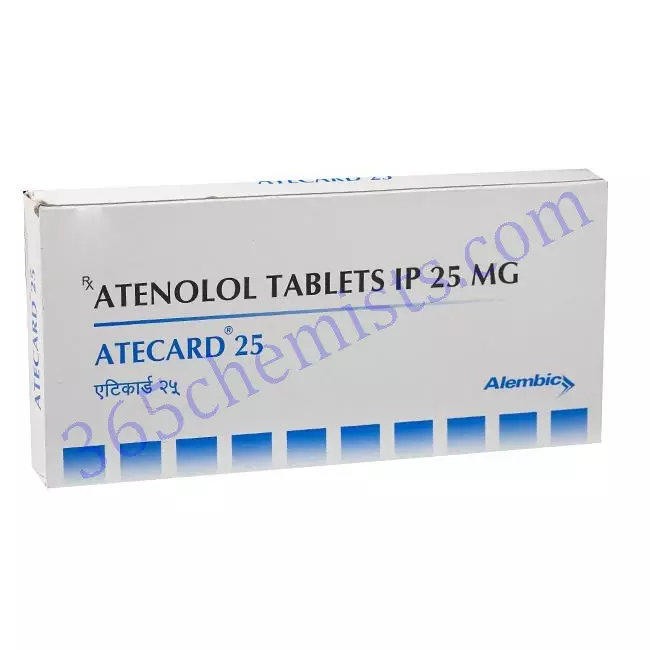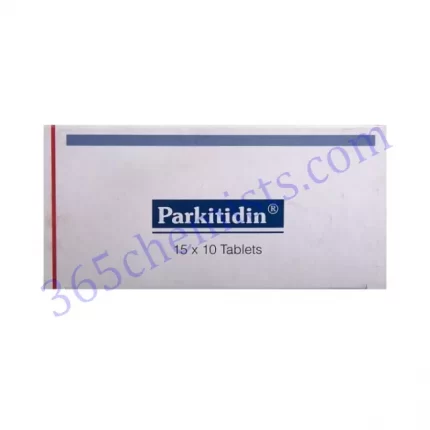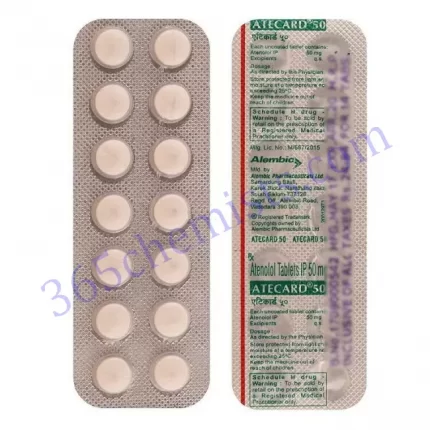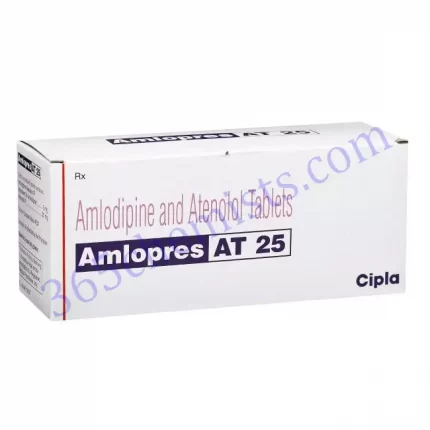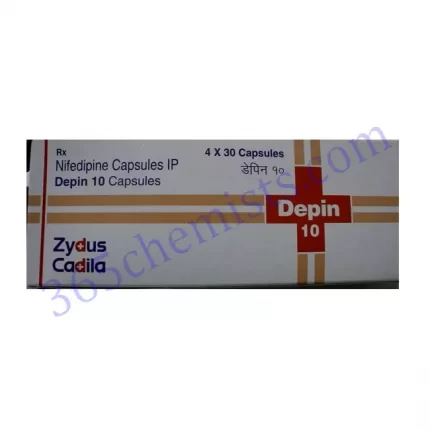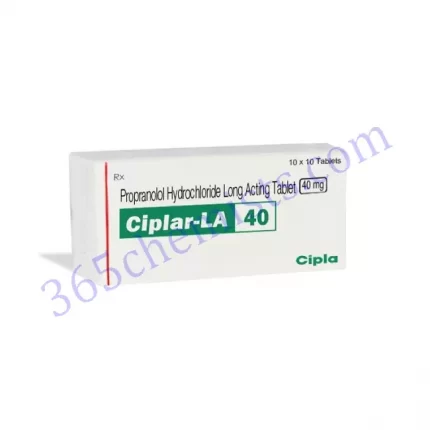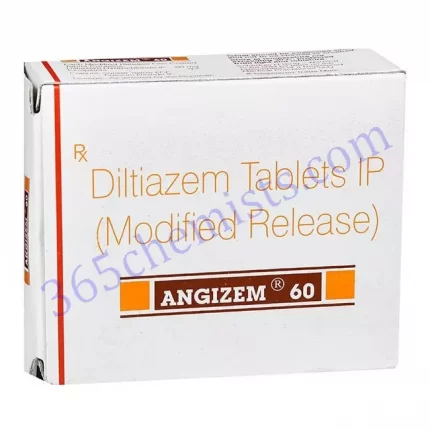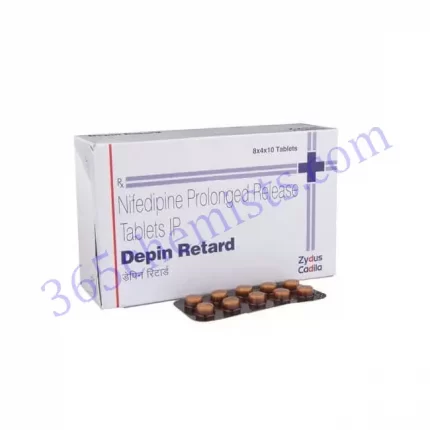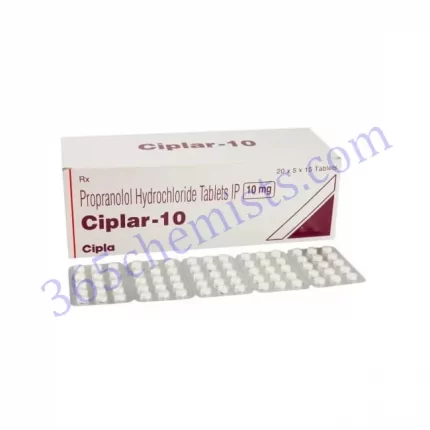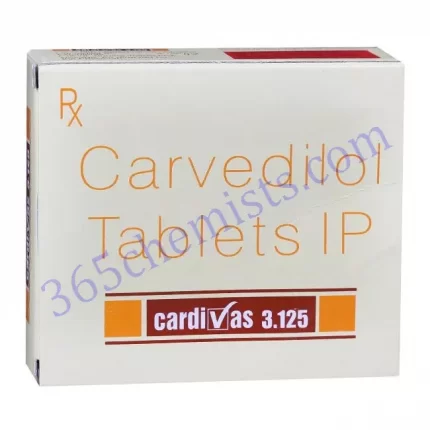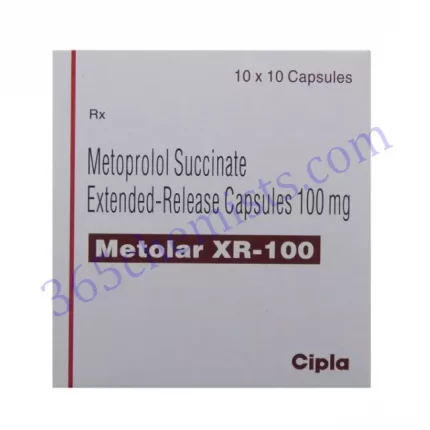Atecard 25 Tablet
Atecard 25 MG Tablet is a medicine that contains Atenolol. It is used to treat high blood pressure, angina pectoris (chest pain or discomfort caused when your heart muscle does not get enough oxygen-rich blood), arrhythmias (irregular heartbeat), thyrotoxicosis (the symptoms caused by the over secretion of the thyroid hormone). It is also used to reduce strain on the heart following a heart attack and to prevent migraines.
Atecard 25 MG Tablet relaxes blood vessels resulting in an improved blood flow to the heart. It also slows down the activity of your heart and reduces the rate and force of the heartbeats. As a result, the pressure at which blood is pumped and the strain on the heart is reduced.
Atecard 25 MG Tablet may cause dizziness, headache, breathing difficulty, and low blood pressure. If you feel dizzy or tired after taking this medicine, avoid driving vehicles or operating machines. Do not take this medicine if you are allergic to it. It can make you feel drowsy when you stand up suddenly, so it is advised that you get up slowly from a sitting or a lying position.
Atecard 25 MG Tablet can be taken with or without food. For the ease of remembering, take this medicine at the same time every day. Do not stop taking this medicine without consulting your doctor. Abrupt stopping the use of this medicine may lead to more serious conditions like a stroke or a heart attack.
Atecard 25 MG Tablet may not be suitable for all people. It may not be recommended for you if you have asthma (or any other breathing conditions), kidney or liver conditions. Consult your doctor before taking this medicine if you are pregnant, planning a pregnancy, or are breastfeeding. Make sure to eat a healthy and balanced diet. Appropriate lifestyle changes like a low-fat diet, exercise, and stop smoking to feel better besides using this medicine.
Substitutes
List of substitutes for Atecard 25 MG Tablet
Aten 25 MG Tablet
Zydus Cadila
Atenex 25 MG Tablet
Zydus Cadila
Latenol 25 MG Tablet
Lupin Ltd.
Obeta 25 MG Tablet
Intas Pharmaceuticals Ltd.
Teno 25 MG Tablet
Ipca Laboratories Pvt. Ltd.
Related Product
Atecard 25 Tablet
Atecard 50 Tablet
Side effects
Major & minor side effects for Atecard 25 MG Tablet
Blurred vision
Sweating
Cold hands or feet
Low blood pressure
Slow heartbeat
Dizziness
Decrease in frequency of urination
Increased thirst
Loss of appetite
Trouble sleeping
Diarrhoea
Uses of Atecard 25 MG Tablet
What is it prescribed for?
Hypertension
Hypertension or high blood pressure is a condition where your blood pressure is higher than normal. This can cause heart and blood vessel damage which can result in serious heart conditions like a heart attack or stroke. Atecard 25 MG Tablet causes blood vessels to relax which helps to reduce the blood pressure.
Angina pectoris
Angina pectoris is chest pain or discomfort due to reduced blood flow to the heart that occurs when the blood vessels are narrowed or blocked. Atecard 25 MG Tablet causes blood vessels to relax resulting in an improved blood flow to the heart. Therefore, Atecard 25 MG Tablet can be used to treat angina pectoris.
Myocardial infarction
Myocardial Infarction is a type of heart disease caused due to the blockage/reduction of blood flow to the heart muscle which causes damage to heart tissue. Atecard 25 MG Tablet is used in this condition to normalise the blood pressure if it is higher than normal which reduces strain on the heart. This decreases the risk of heart attacks and also aids in recovery after a heart attack.
Cardiac arrhythmias
Cardiac arrhythmia is a condition where the rate or rhythm of your heartbeat is irregular and improper. Atecard 25 MG Tablet is used in this condition to reduce the rate and force of contraction of the heart if it is higher than normal.
When not to use?
Allergy
Avoid taking Atecard 25 MG Tablet if you are allergic to it. Seek immediate medical attention if you notice any symptoms of allergic reactions such as skin rash, itching/swelling (especially of the face/tongue/throat), severe dizziness, breathing difficulty, etc.
Cardiogenic shock
Cardiogenic shock is a condition in which your heart is unable to pump enough blood to the organs. If you have this condition, taking Atecard 25 MG Tablet can further reduce the amount of blood in your blood vessels, which can lead to serious side effects and complications.
Heart block greater than first degree
There are electrical signals that control the heartbeat and cause your heart muscle to contract and pump blood properly. Heart block occurs when these signals are slowed down. Heart blocks can be first, second, or third-degree based on severity. Atecard 25 MG Tablet is not recommended to treat second or third-degree heart block that requires emergency attention.
Bradycardia
Bradycardia or slow heart rate occurs when your heart beats less than 60 times per minute. It can lead to serious heart conditions like a heart attack. Atecard 25 MG Tablet is not recommended for use in such cases as it can slow the heart rate even further which can worsen your condition and lead to other complications.
Decompensated heart failure
Decompensated heart failure is a condition where a change in the structure of heart tissue leads to the inability of the heart to pump and/or maintain normal blood pressure levels. Atecard 25 MG Tablet can further lower the blood pressure in people with decompensated heart failure which may cause a need for immediate medical intervention.
Warnings
Warnings for special population
Pregnancy
Atecard 25 MG Tablet is safe to be used in pregnancy as it is not known to cause birth defects in your foetus. Hence, it is acceptable for use upon your doctor’s recommendation. All the risks and benefits should be discussed with your doctor before starting the treatment with this medicine.
Breast-feeding
Atecard 25 MG Tablet is not recommended for use during breastfeeding. It passes into breast milk at low levels and may cause harm to your baby. However, consult your doctor before taking this medicine.
General warnings
Driving or operating machines
Atecard 25 MG Tablet may cause dizziness and fatigue in some people. It is advised that you do not perform any activities such as driving vehicles or operating machines if you experience any of these symptoms during treatment with this medicine.
Major surgery
Atecard 25 MG Tablet should be used with caution if you are going for undergoing major surgery. Your doctor may adjust the dose of this medicine to be taken before and after the surgical procedure.
Hyperlipidaemia
Hyperlipidaemia is a condition where the levels of fat or cholesterol in your blood are high. Atecard 25 MG Tablet can increase the cholesterol levels in the blood. Atecard 25 MG Tablet should be used with caution if you have hyperlipidaemia. Your doctor may adjust the dose of this medicine if required based on your condition.
Sports
Athletes are advised not to indulge in certain sports while using Atecard 25 MG Tablet. Archery, racing, shooting and other high-risk sports should be avoided. Sportspersons should refer to the list of medicines published by the World Anti-Doping Agency (WADA) that are not to be taken while participating in certain specific sports.
Use in children
Atecard 25 MG Tablet is generally not recommended for use in children below 18 years of age. If it is prescribed for children then caution must be taken to ensure the exact dosage is given to the child. Inform your doctor if your child has any conditions like asthma or any liver and kidney problems.
Hyperthyroidism
Atecard 25 MG Tablet may be used to control symptoms like a fast or irregular heartbeat, anxiety, heat intolerance, or shivering in people with very high thyroid levels. If the use of this medicine is stopped abruptly, it can lead to a condition called thyroid storm, where your body suddenly starts overproduction of thyroid hormones. Hence, treatment should gradually be stopped with dose reduction for 1-2 weeks under the supervision of your doctor.
Dosage
Missed Dose
If you forget to take a dose of Atecard 25 MG Tablet, take it as soon as you remember. If it is time for your next dose, skip the missed dose and take your next dose at the scheduled time. Do not double your dose to compensate for a missed one.
Overdose
Never take more than the prescribed dose of Atecard 25 MG Tablet. If you suspect that you might have taken an overdose of this medicine, seek immediate medical attention.
Interactions
All drugs interact differently for person to person. You should check all the possible interactions with your doctor before starting any medicine.
Interaction with Alcohol
Description
N/A
Instructions
Avoid drinking alcohol while taking Atecard 25 MG Tablet as it may increase the risk of symptoms like very low blood pressure, headache, dizziness, lightheadedness, fainting, and/or changes in pulse or heart rate.
Interaction with Medicine
Alprazolam
Tizanidine
Theophylline
Diltiazem
Diclofenac
Ceritinib
Digitoxin
Indomethacin
Disease interactions
Asthma/ COPD
Use Atecard 25 MG Tablet with caution if you have asthma or chronic obstructive pulmonary disease (COPD). Atecard 25 MG Tablet use can aggravate breathing difficulty and also worsen the symptoms of such respiratory conditions.
Glaucoma
Glaucoma or high eye pressure occurs when the nerve connecting the eye to the brain is damaged. Take Atecard 25 MG Tablet with caution and with your doctor’s supervision if you have Glaucoma as it may increase the risk of mydriasis (a condition in which the pupil of your eye gets widened due to increased eye pressure). Your doctor may adjust the dose of this medicine if required based on your condition.
Diabetes
Atecard 25 MG Tablet can mask the symptoms of low blood sugar if you have diabetes. Your doctor may monitor your blood sugar levels while on treatment with this medicine.
Kidney diseases
Atecard 25 MG Tablet filtered in the kidney and eliminated through urine. If you have kidney problems, use this medicine with caution as it may accumulate in the impaired kidneys and cause serious side effects. Your doctor may adjust the dose of this medicine and suggest tests to monitor your kidney function based on the clinical condition.
Peripheral vascular disease
Atecard 25 MG Tablet can widen blood vessels and reduce cardiac output (amount of blood pumped by the heart). This may worsen the symptoms of insufficient blood supply associated with peripheral vascular disease. Your doctor may suggest tests to monitor your heart functioning and adjust the dose of this medicine if required based on your condition.
Food interactions
Using Atecard 25 MG Tablet together with multivitamins with minerals may reduce the effectiveness of this medicine. Take Atecard 25 MG Tablet 2 hours before taking multivitamins with minerals.
Orange juice affects the absorption of this medicine. Frequent consumption of orange juice during therapy with Atecard 25 MG Tablet can decrease its effectiveness.
Lab interactions
Information not available.
This is not an exhaustive list of possible drug interactions. You should consult your doctor about all the possible interactions of the drugs you’re taking.
General Instructions
Atecard 25 MG Tablet can be taken with or without food or as directed by your doctor. For the ease of remembering, take this medicine at the same time every day.
Do not stop taking this medicine without consulting your doctor. Abrupt stopping the use of this medicine may lead to more serious conditions like a stroke or a heart attack.
Atecard 25 MG Tablet may mask the symptoms of diabetes so regular monitoring of blood glucose levels may be required.
Inform your doctor if you experience any undesirable effects or if you experience headaches after the first week.
It may make you feel drowsy and increase the risk of fall if you stand up suddenly, so it is advised that you stand up slowly and with some support.
Avoid driving vehicles or operating machines after taking this medicine as may cause dizziness.
Appropriate lifestyle changes like a low-fat diet, exercise, and smoking cessation should be done along with this medicine to get the best possible effect.
Keep the medicine away from the reach of children and pets. Do not use it after the expiry date. Ensure that unused medicine is disposed of properly.

